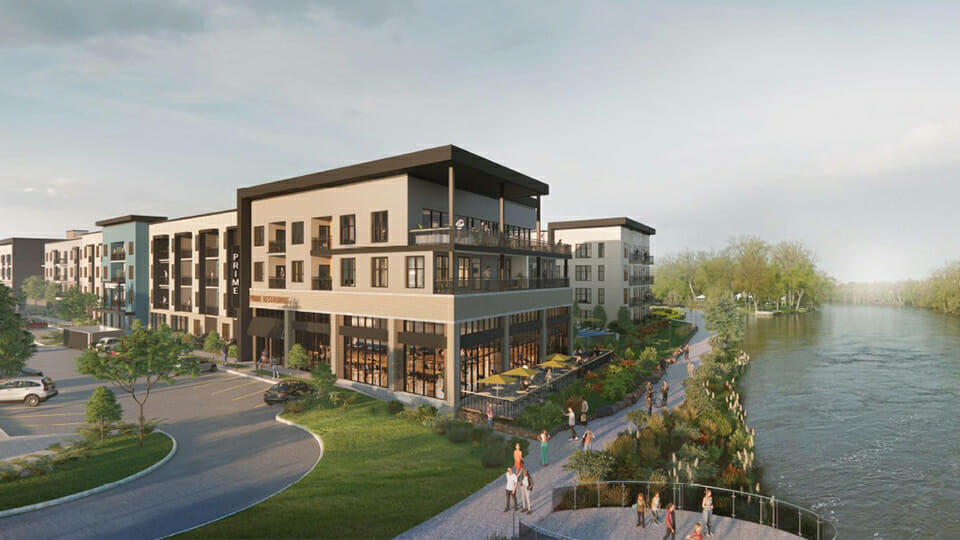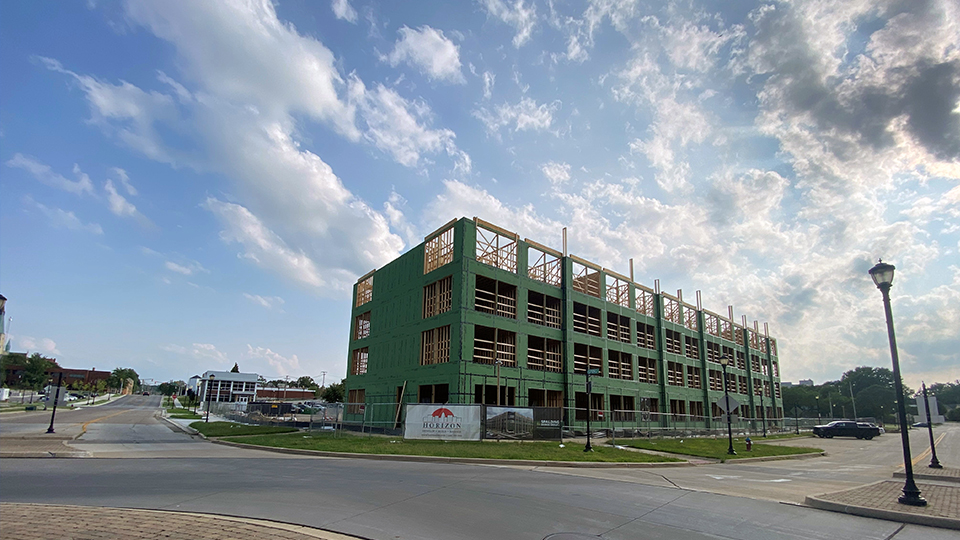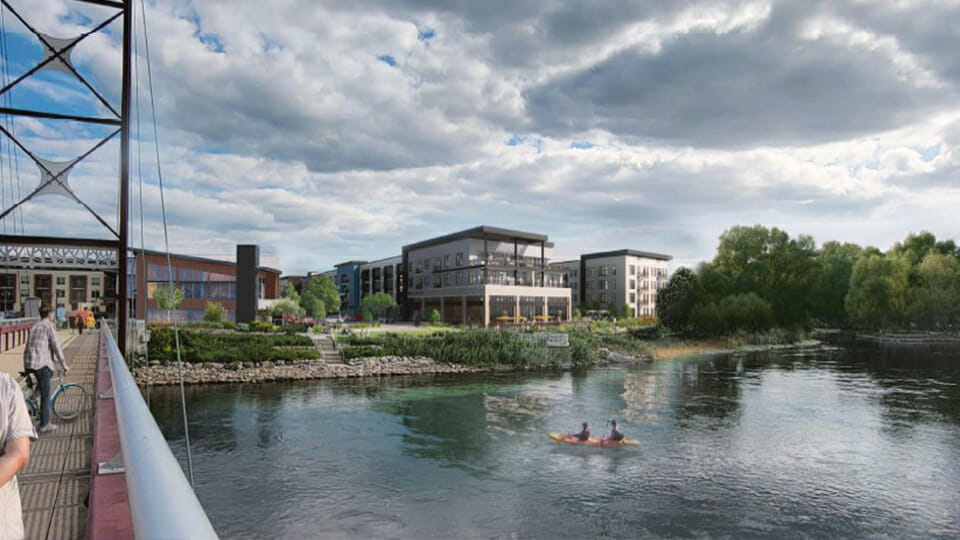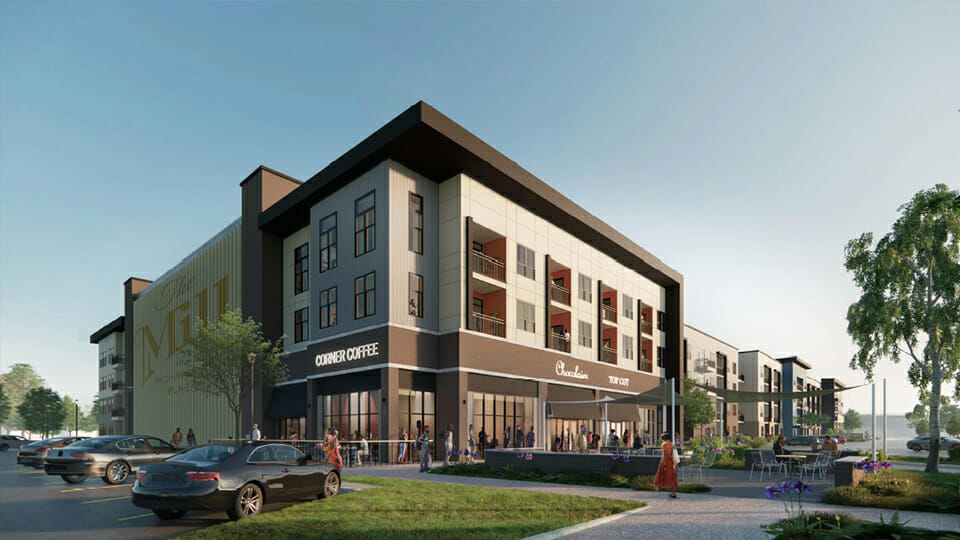Mishawaka greenlights second phase of transformational riverwalk development
Subscriber Benefit
As a subscriber you can listen to articles at work, in the car, or while you work out. Subscribe Now
City officials are giving their support for the next stage of development on Mishawaka’s rapidly growing Riverwalk.
The Mishawaka City Council took steps Monday night to advance the second phase of the multi-million-dollar apartment complex, The Mill at Ironworks Plaza, at the city’s Beutter Park along the St. Joseph River.
The first phase of the project, developed and managed by Indianapolis-based Flaherty and Collins Properties, opened for residential rental in 2019. It features 232 apartments and, in a matter of years, has transformed the riverfront area with a new community event center, ice skating ribbon and outdoor biergarten.
The second phase of the project will sit on 2.7 acres just west of the existing apartments and offer riverfront views, dining and other outdoor amenities.
Its development comes as a time of rapid expansion for downtown Mishawaka with the recent move of city offices to the former Liberty Mutual Insurance building, a block south of The Mill, and noticeable vertical growth this summer at the Avalon — a 100-plus-unit complex going up across the street from The Mill. City officials say they expect that building, of mostly studio apartments overseen by local developer Pat Matthews, to open near the end of this year or at the start of 2024.

The Mill is a project city officials say checks all of the boxes they’ve long looked for in riverfront development: a mixed use structure that’s architecturally significant and pedestrian friendly.
The second phase project will feature 227 studio, one-bedroom and two-bedroom apartments, leasing in the range of $1,100 to $2,000 a month. Amenities for residents include a pet spa, fitness club, bike storage and a mix of rentable private offices and coworking space.
The second phase will also feature a combined 10,000 square feet in retail space shared between two, yet-to-be-announced anchor businesses. The city supports an expansion of riverfront dining to complement recent additions such as Sun King Brewery, Social Cantina and Mishawaka Public House — all of which opened within the last year.
Mayor Dave Wood speaks on the transformation of downtown Mishawaka.
The developments come at the site of Mishawaka’s former Ball Band/Uniroyal factory and are expected to grow tax revenue in an area many had counted out. Now, Mishawaka’s mayor says the success of The Mill Phase I is spurring expansion into the luxury housing market and positioning Mishawaka to compete with cities like Raleigh and Durham, North Carolina for young professionals.
“People are picking … where they want to live before they’re picking their job,” Mishawaka Mayor Dave Wood said. “We want Mishawaka to be a place that is considered.”
City leaders gave their approval Monday night to create a new tax increment financing district and issue city bonds to help finance The Mill’s second phase. The city will pay back the bonds with money generated by the new, 25-year TIF district.

Despite its smaller size, total costs for the $63 million second phase are expected to blow past its Phase I predecessor. The city is contributing $13.6 million and land for the project, valued at $1 million, to the public-private partnership struck with developers. Flaherty and Collins expect to invest $43 million in private funds and will seek more than $5.6 million in state redevelopment tax credits.
The expense is likely a result of inflated construction costs, city leaders said during an information meeting last week. The first phase one was originally estimated to cost $42 million and rose to $50 million by its completion. But, city leaders say they’ve sought assurances that developers will absorb any unforeseen costs.
Mishawaka leaders see value in the project considering the quick leasing of Phase I, which developers say is fully occupied and filling units quickly when vacancies arise. The units have gone a long way to attract new residents to the area, city officials say, with 80% of initial tenants moving to the complex from outside Mishawaka, and 30% of residents coming from outside of the state.
Flaherty and Collins representatives say when residents leave their developments, about half do so to buy a home within the same zip code.

The tax impact alone has proved to be attractive quality of the new development. Ken Prince, the city’s executive director of planning and community development, said during last week’s informational meeting that The Mill’s second phase, by his calculations, brings a tax revenue to Mishawaka over time equal to that of a 400-unit housing development built outside of the downtown area.
That’s significant especially for the School City of Mishawaka, a small, 8-square-mile district that captures a section of the city with little room for new housing developments and the assessed value they bring.
City officials say with the success of Phase I, they’re seeing attitudes change about downtown Mishawaka — and not just about living on the riverfront, but among current Mishawaka residents who now want to eat, drink and shop in the area.
Wood speaks on Mishawaka’s push for more housing.
The downtown development is bringing business not only to new restaurants like Sun King, officials say, but also to local mainstays like Doc Pierce’s Restaurant on Main Street.
It’ll also open up additional free, three-hour public parking to service the riverfront as the city expands events like its growing, weekly Mishawaka Farmers Market. The existing Mill apartment building offers 133 public parking spaces in its onsite garage, while the phase two building is expected to bring 130 more in a five-story garage.
“(There were) a lot of naysayers at first,” Wood said. “Now what we have seen is, ‘Wow, this is cool. I love coming to an event in downtown Mishawaka.'”
With approvals this week, developers say they expect to close and break ground on the Phase II property in mid-September.
